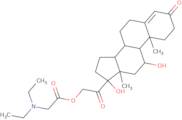Hydrocortamate
CAS: 76-47-1
Rif. 3D-AAA07647
| 1g | Fuori produzione | ||
| 5g | Fuori produzione | ||
| 1mg | Fuori produzione | ||
| 10mg | Fuori produzione | ||
| 100mg | Fuori produzione | ||
| 250mg | Fuori produzione | ||
| 500mg | Fuori produzione |
Informazioni sul prodotto
- 17-Hydroxycorticosterone 21-(diethylamino)acetate
- Cortisol, 21-ester with N,N-diethylglycine
- Ethamicort
- Glycine, N,N-diethyl-, 21-ester with cortisol
- Hidrocortamato
- Hydrocortamat
- Hydrocortisone 21-(diethylamino)acetate
- Magnacort
- Pregnane, glycine deriv.
- (11beta)-11,17-dihydroxy-3,20-dioxopregn-4-en-21-yl N,N-diethylglycinate
- Vedi altri sinonimi
- hydrocortisone 21-(N,N-diethylglycinate)
- cortisol 21-diethylaminoacetate
- Glycine, N,N-diethyl-, (11β)-11,17-dihydroxy-3,20-dioxopregn-4-en-21-yl ester
- 11,17-dihydroxy-3,20-dioxopregn-4-en-21-yl N,N-diethylglycinate
Hydrocortamate is a human analog that has been shown to have potent anticancer effects. It acts as an inhibitor of chitin, a major component of the cell wall in fungi, and induces apoptosis in cancer cells. Hydrocortamate has also been found to inhibit the activity of kinases, which play a key role in cancer cell proliferation. This drug is excreted in urine and has been shown to be effective against various types of cancer, including Chinese hamster ovary tumors. Hydrocortamate can be used as an inhibitor of heparin-induced potassium release, making it useful for treating conditions such as cardiac arrhythmias.





